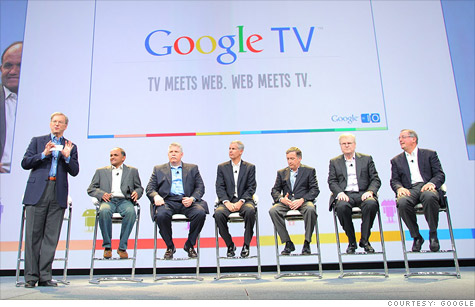Search News

At Google I/O last year, then-CEO Eric Schmidt unveiled Google TV with six CEO partners drawn from the top ranks of the consumer electronics industry.
NEW YORK (CNNMoney) -- Google is a master of Web software. When it comes to devices, though, the master struggles.
Google TV received such lukewarm reviews that the company decided to delay the release of future products using the software until it could make significant improvements. Smartphones have been an incredible success in terms of sales, but consumers, manufacturers and developers have expressed frustration with the Android operating system. It's still early for tablets, but Google's highly anticipated Honeycomb -- released two months ago -- has been buggy and sales are disappointing.
The company's mixed success in the gadget world will be a hot discussion topic at Google's annual I/O developer conference, which begins Tuesday in San Francisco. There, Google (GOOG, Fortune 500) is expected to release another herd of devices into the wild: Analysts widely believe Google will launch its Chrome operating system for desktop computers.
Why is Google's track record amazing on Web apps and so spotty on consumer devices?
There are a few culprits. One is middlemen. When Google invents Web products, it delivers them straight to consumers. But when Google designs for gadgets, it needs manufacturers to partner up and make them. That's a complicated relationship that Google is still learning how to navigate.
"Google is trying to drive the pace of innovation, but it gives the handset manufacturers a little too much control," said Todd Christy, president of application development platform Pyxis Mobile. "That presents challenges to the industry, and the pain is borne by the consumer. Google needs to assert itself more."
A recent Baird Research study found that 56% of Android developers think that fragmentation among the various Android devices is a meaningful or "huge" problem. That percentage has increased over the past three months.
Another problem: Google has a habit of approaching gadgets with a software-maker's mindset. It likes to launch not-quite-ready projects and then quickly improve them on the fly.
That works just fine on the Web. No one's paying for Google Voice, Google Maps or Gmail, so Google can release those applications and tweak them without many complaints from users.
But when you're paying $600 for a Google TV, $200 for an Android phone or $800 for an Android tablet, you're going to want those things to work perfectly. That's just not how Google operates.
"Google obviously takes an experimental approach with many of its initiatives, externalizing many processes that traditionally are kept behind closed doors," said Al Hilwa, analyst at IDC. "That can put their partners and customers through frustrating experiences at times."
Google's open approach lets device makers tinker with and personalize the Google experience on their gadgets. But its near-constant stream of major updates forces manufacturers to spend time configuring the new updates for each device and all of its unique specifications.
That doesn't happen quickly. Just 4% of Android smartphone users are running the latest version, "Gingerbread," which was released in December. The vast majority are still running Froyo, which launched in May 2010, and a quarter of users are still on Eclair, which came out all the way back in January of last year.
That leaves app developers trying to design software that will run on many different versions of the same operating system. Their apps need to work on a wide range of devices with varying screen sizes, hardware components and functionality.
It also means that customers with Google devices are left waiting (and waiting, and waiting) for software updates.
Apple (AAPL, Fortune 500), of course, is on the other extreme. That company designs the operating system and every minute detail of the hardware it runs on through and through, creating an extremely unified experience for the iPhone and iPad. But if you want to toy with that system -- or even just design an app that Apple doesn't like -- you're out of luck.
"People want innovation and differentiation, but they also want the consistency of the Apple and Microsoft world," said Ken Dulaney, analyst at Gartner. "Unfortunately, you can't have both."
Google representatives declined to comment on the company's approach to gadget development, pointing instead to a recent blog post by Android chief Andy Rubin.
Google tries to fight fragmentation by requiring those that market "Android-compatible" devices to meet some basic consistency requirements, he wrote. Rubin also defended Google's software release schedule: "We continue to be an open source platform and will continue releasing source code when it is ready."
Clearly, Google has done plenty of things right. Android is the top-selling smartphone operating system in the world. Honeycomb wasn't an instant tablet success, but it also took Android years to become a legitimate smartphone contender.
But projects like Google TV show that Google's ambition stretches far beyond computers and phones. (We're not even going to get into the robot cars.) At last year's I/O, then-CEO Eric Schmidt assembled a glittering who's who list of CEOs from gadget power players -- Sony (SNE), Logitech (LOGI), Intel (INTC, Fortune 500), Best Buy (BBY, Fortune 500) and Dish Network (DISH, Fortune 500), among others -- on stage join him in launching Google TV.
To make alliances like those pay off, Google needs to get better at working with -- and thinking like -- the world's best gadget makers.
"It's not that Google doesn't understand electronics manufacturers specifically, it's that Google doesn't understand more traditional companies generally," said James McQuivey, analyst at Forrester Research.
Google is like a "huge, dispassionate algorithm -- they value efficiency and assume everyone else does as well," he said. "So there's generally a disconnect when Google tries to interface with other companies that have grown up with different rules than Google has internalized." ![]()